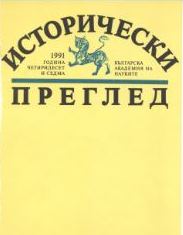Главлит (1952–1956). Изграждане на единна цензурна система в България
GLAVLIT (1952–1956). The creation of a uniform censorial system in Bulgaria
Author(s): Vesela ChichovskaSubject(s): History, Cultural history, Recent History (1900 till today), Special Historiographies:, Post-War period (1950 - 1989), History of Communism
Published by: Институт за исторически изследвания - Българска академия на науките
Summary/Abstract: The examination of the censorial policy after the Second World War lights up more thorough and more deeply the important aspects of the large theme about the creation and the confirmation of the totalitarian system in Bulgaria. It gives possibility to characterize the outer and inner factors, influencing the development of the Bulgarian society for more than four decades. The article follows the stages in the creation of the censorial policy from the 9th of September 1944 till the end of 1952, when the General Office on the problems of literature and publishing houses (Glavlit) is formed. This is a Soviet type institution and it marks the final stage of the process of Sovietization of the country. The research follows the basic moments in the activity of this office which strictly controls the mass-media, the publishing houses, the contents of the library funds, the book exchange and the correspondence of the state and social institutions and citizens with other countries, as well as the manifestations of the writers, the scientific workers etc. In the research special attention is payed to the formation of the principles and criteria of control of Glavlit, the first task of which is the formation of a special list of problems, considered as a state secret. This list is in the basis of the whole censorial activity of the office. It is shown that from the creation till the closure of Glavlit in the summer of 1956 its work is going on under the direct observation of the representatives from the Soviet censorial institutions and Vulko Chervenkov personally, who is Prime Minister at that time and till 1954 a secretary-general of the Central Committee of the Bulgarian Communist Party. On the basis of documental sources it is proved that the closure of Glavlit does not lead to liberalization of the censorial regime in the country and it is only a formal act. It does not make changes in the principles, the comprehensiveness and the extraordinary strictness of the censorship, preserved the ruling organs of the communist party till the end of the 80s.
Journal: Исторически преглед
- Issue Year: 1991
- Issue No: 10
- Page Range: 38-69
- Page Count: 32
- Language: Bulgarian
- Content File-PDF

